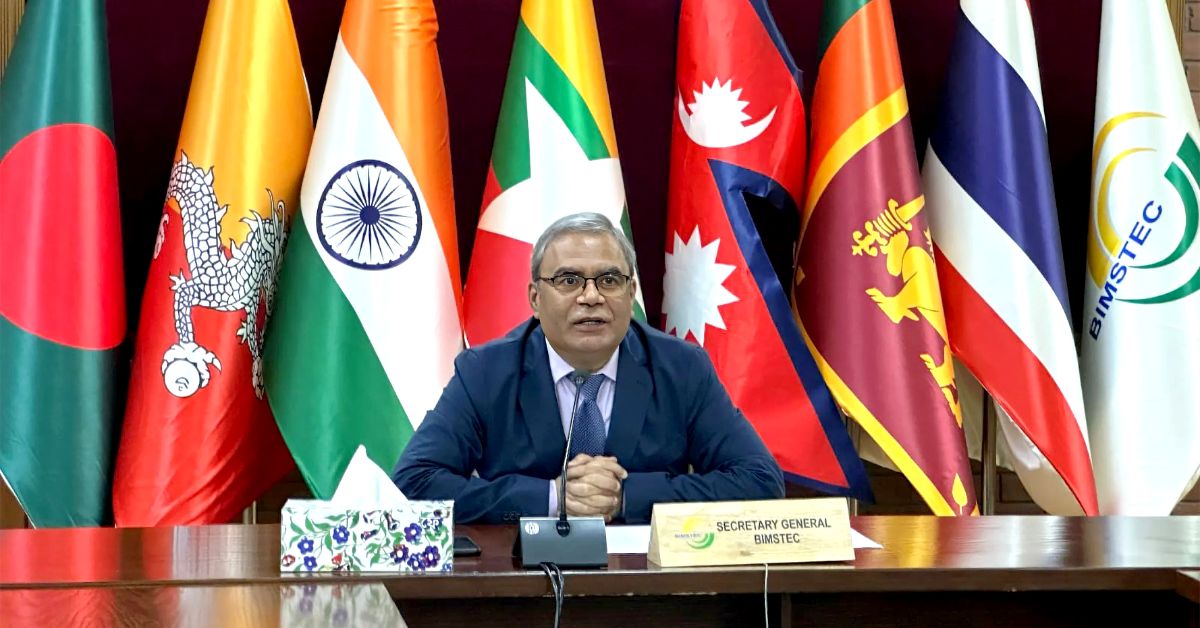
The organization that connects South Asia with Southeast Asia—BIMSTEC—concluded its 6th Summit in Bangkok, Thailand, during the first week of April. Soon after, a BIMSTEC Agriculture Ministers-level meeting was held in Kathmandu, adding momentum to the organization’s growing activity in recent years.
Much of this renewed energy is credited to its Secretary General, H.E. Indra Mani Pandey—a seasoned Indian diplomat who took office on January 4, 2024. His distinguished career includes postings as India’s Permanent Representative to the United Nations, Ambassador to Oman, and roles in several other key international forums.
The Diplomat Nepal sat down with Secretary General Pandey to discuss key developments within BIMSTEC and the road ahead. Excerpts:
The 3rd BIMSTEC Ministerial Meeting on Agriculture, held on 09 April in Kathmandu, Nepal, was successful in realising its goals. The Ministers reviewed the progress and outlined the future course of regional cooperation in Agriculture, Food Security, Fisheries, and Livestock.
The Meeting adopted the Plan of Action on BIMSTEC Fisheries and Livestock Cooperation, which outlines a comprehensive framework to revitalize the fisheries and livestock sector in the region. They also adopted a Joint Statement, reaffirming the member States’ commitment to strengthen regional cooperation in agriculture and allied sectors, under the BIMSTEC framework.
The BIMSTEC Agriculture Ministers expressed their strong commitment to enhancing collaboration in agriculture, food security, fisheries, and livestock sectors at the meeting. The Ministers also underscored the importance of adopting innovative and climate resilient technologies to enhance food security and ensure long-term agriculture sustainability across the region.
The 6th BIMSTEC Summit of the Heads of State/Government of the member States of BIMSTEC was held on 04 April 2025, in Bangkok, Thailand. It was attended by Heads of State/Government of all the member States, and it was the first in-person Summit of BIMSTEC Leaders since the Kathmandu Summit in 2018.
The 6th Summit, themed “Prosperous, Resilient, and Open BIMSTEC”, focused on fostering collaboration among the member States to address their shared security and developmental challenges. It provided a new impetus to realise the goal of a “Prosperous, Resilient and Open BIMSTEC”. Key outcomes of the 6th Summit are: adoption of the 6th BIMSTEC Summit Declaration and the BIMSTEC Bangkok Vision 2030; the Agreement on Maritime Transport Cooperation and Memoranda of Understanding with the Indian Ocean Rim Association (IORA) and the UN Office on Drugs and Crime (UNODC).
The Summit also adopted the Rules of Procedure for various BIMSTEC mechanisms and endorsed the Report of the Eminent Persons Group on the Future Direction of BIMSTEC. Leaders reaffirmed their commitment to strengthening BIMSTEC and proposed concrete actions to advance regional trade, connectivity, climate action, food security, disaster management, tourism, and security cooperation. In today’s complex geopolitical and economic environment, the Summit reaffirmed BIMSTEC’s vital role in shaping a cooperative and resilient Bay of Bengal region.
As an intergovernmental organization, aimed at fostering economical and technical cooperation among member States, the BIMSTEC has focused on assisting its member States in realising SDG’s Agenda 2030, as reflected in its vast and diverse agenda. Please note that we have always attached a high priority to cooperation in economic, technical, and climate change.
Like many intergovernmental organizations, BIMSTEC operates on the principle of consensus, which may take a long time. We are pleased that the BIMSTEC Charter officially entered into force on 20 May 2024, giving the Organization a legal personality. The Charter was signed during the 5th BIMSTEC Summit held virtually in Colombo on 30 March 2022, and it entered into force after ratification by all the member States.
With a legally binding Charter and well-established decision-making structures — including Summits, Ministerial and Senior Officials’ Meetings, the Permanent Working Committee, and various sectoral Working and Expert Groups — BIMSTEC is well-positioned to become a dynamic and vibrant regional organization. Its wide-ranging agenda spans 15 sectors and sub-sectors that align closely with the Sustainable Development Goals (SDGs).
By deepening cooperation across these areas, BIMSTEC can help member States tackle their shared security, development, and climate change-related challenges. BIMSTEC is poised to grow into a vibrant platform for advancing peace, prosperity, and resilience in the Bay of Bengal region.